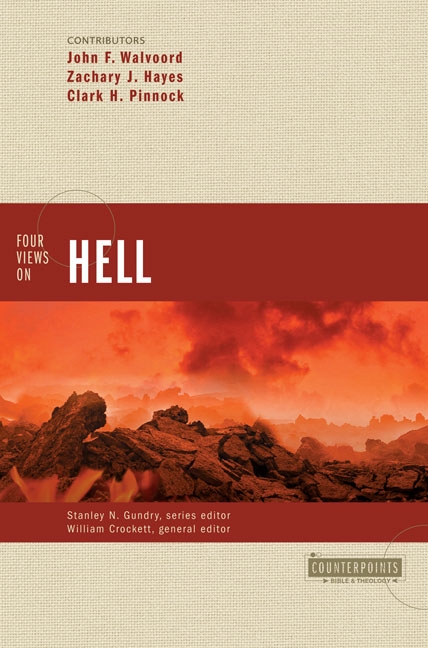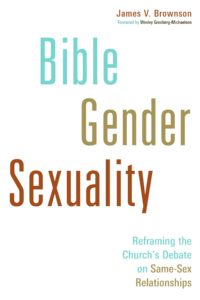
Year Published
1996
Authors
Topics
Synopsis
Overall Rating
Final Thoughts
Year Published
1996
Authors
Topics
Synopsis
Final Thoughts
Overall Rating
In an effort to refine my own personal view on hell, I’ve chosen to read a book that presents the four main views on hell from recognized scholars. In my book brief, I will gloss over each of the views and recognize their strengths and their weaknesses.
Literal View
In typical fundamentalist fashion, this view desires to take everything about hell within the Bible literally. Within this framework, hell is a literal, physical place where those who reject God will be tormented by literal fire forever and ever. This view has the benefit of being the one most Christians are taught, I know I was growing up. It also has the basic tendency to take the Bible at its word, which everyone wants to do. Why do we want to do this? For one, because it makes exegesis easier. If we’re able to take the Bible at its face value we have to do no work. Second, it has the illusion of removing presuppositions from the text, and let it speak for itself. Unfortunately, as we’ll see in the weaknesses of this view, it actually adds more presuppositions to the text.
I had a hard time reading this section. The author made all his claims without substantiating them, presenting them as fact with no solid logic behind them. For instance, he talked about sheol is used in the old testament to either mean “grave” or something akin to “hell.” He asserts that because we sometimes translate it as “hell” into English that’s what it means. (I kid you not that’s his logic for interpreting the word in such a way).
Somehow, he manages to jump from Jesus referencing the actual place of Gehenna to an eternal fire. I have no idea how he made said connection.
He moves on to discuss the use of Gehenna in the New Testament. He makes sure to point out that Gehenna is a real place to the readers. It’s essentially a giant public graveyard outside the city. There’s frequently fire there. Somehow, he manages to jump from Jesus referencing the actual place of Gehenna to an eternal fire. I have no idea how he made said connection. But, to him, it’s “clear”. He also discusses the use of words meaning forever/eternal and concedes that sometimes they don’t always mean forever or eternal. He gives no rationale, however, for when they are to mean which and simply asserts that when talking about hell they obviously mean forever.
One of his last points addresses Revelation where it says, “Death and Hades were thrown into the lake of fire. The lake of fire is the second death.”(20:14). Now, he states that it’s not an actual death and that all unrepentant sinners will be cast into the lake of fire as well. However, if we wish to take the text literally we see that “death and Hades were thrown into the lake of fire.” Not everyone. It then says, “The lake of fire is the second death.” There’s no way it can be a death without it being a death. The literal view presented int his chapter desires to take the Bible at its face value but fails to do so in this instance. We were to read this verse and take it at its face value it would seem that death and Hades (a word used sometimes to describe hell) are put to an end. What then happens to the people that were in Hell? Maybe they’re freed. Maybe they’re annihilated. This verse doesn’t say so. But, the author wants to cling so tightly to his literal view, that he puts his own presuppositions into the text to make it say what he wants it to.
Metaphorical View
I’m not entirely sure the purpose of this chapter. He spent a lot of time arguing against the literal view of hell. Not that hell doesn’t exist, but that God speaks to people in ways they understand, so the use of fire for hell was mostly to illustrate a place that you don’t want to be, not a place of actual fire. He never addresses what it might be instead (which is good, in a way, because he makes it clear that God doesn’t reveal everything to us). He uses the example of how heaven is described as a great city in their time, but not how we would see a great city today to emphasize his point.
What I don’t understand, however, is why he spends about half of his own section arguing against annihilation which, admittedly, he almost defends a few times. He’s given the opportunity to respond to this view later, so why he spends a good deal addressing it in his own chapter is beyond me. Alas, his rebuttal of it is not very convincing. He tries to show how the church has always viewed hell as eternal but then discusses how the immortality of the soul may have been a Hellenistic idea that infiltrated the church. If that’s so, then is it really a genuine God-given concept, or something that was adapted to fit Christianity?
If the entire premise of your argument is the differentiation between literal and figurative, wouldn’t it make sense to make sure all of your points are differentiated and substantiated?
He also addresses how most of the language of hell is “figurative”- ie, the fire isn’t an actual fire, people aren’t actually gnashing their teeth, and nobody is constantly consumed by maggots. He then goes on to assert that “eternal” is always eternal without even considering the idea that “eternal” is figurative or even limited as well. If the entire premise of your argument is the differentiation between literal and figurative, wouldn’t it make sense to make sure all of your points are differentiated and substantiated?
He also seems to hold two views of hell. From reading his chapter, he’s arguing for an intermediate period where people are in Hades for a period of time being tormented, and then, upon the final judgment, are cast into the lake of fire (Gehenna) to be punished forever. What happens to the righteous during this intermediate period? Are they always in heaven? Why do they not have to have two different resting places? His view leaves a lot to be desired.
Purgatorial View
I’m upset with this view. There’s no denying that. I’m upset mostly because it wasn’t the universalist view that I was hoping for. I’m also upset though by the lack of evidence for this view and the arguments presented by the author. The author changed the entire topic of his view from hell to an intermediate state. He asserts that after one dies they enter into a purgatory where they are cleansed before they can enter heaven, or (I guess) punished before they are thrown into hell.
His basic premise is this- when one dies they are [most likely] neither “good enough” to get into heaven or “bad enough” to be sent to hell. Yes. The worldview of “I’m a good enough person” that Christianity tries so hard to refute is the entire premise for this view of the afterlife. This view is also supported nowhere in scripture. The author gives three citations that could support the view (one of which is in the Apocrypha). He then goes on to detail how they could also not support the view without arguing against the rebuttal. I can only assume that’s because the rebuttal makes more sense.
The view is held mostly by tradition. Those who hold this view look beyond just the Scriptures to get their theology and give tradition a very high value. We’ve seen many times throughout history how tradition has done irreparable harm to not only Christianity but society as a whole. Relying on tradition for one’s theological beliefs is dangerous and can bring you far away from the message of Christ and the Bible.
This [purgatory] is something that Jesus simply does not allow for.
The biggest problem with the view is the idea of an interim state. This is something that Jesus simply does not allow for. He tells the thief on the cross beside Him, “Today you will be with me in paradise.” Now, one theoretically could argue that there’s just not interim state for this man. But that doesn’t make sense. The interim state is for those who aren’t perfect upon death and need to be cleansed of remaining guilt (another problem of its own) before they can enter heaven. Surely the being crucified was not a saint suddenly and would still have residual guilt and sin that had not been atoned for and would require purgatory in order to be “good enough” to enter Heaven. But no. Jesus invites him right away.
Conditional View
The first thing I would like to get out of the way is the rebuttal to the author’s idea that hell is ruled by Satan. This is a common idea in people’s eschatology, but it couldn’t be any less true. No reference to Hell describes it as ruled by Satan. Furthermore, Satan is said to be punished at the end of days, which is inconsistent with him also ruling the punishment of others.
Now that that’s handled, we can discuss annihilationism it’s own. The idea is this- when people die, they go to hell for a period of time but, in the end, they are destroyed forever. According to the author, this is a more historically and Biblically accurate view of the afterlife. He argues that the Bible has always taught the ultimate death of those who reject God. According to him, the immortality of the soul is not something that’s inherent to the soul, but something that God gives to it. Much like what the metaphorical view’s author argued against, he presents that the immortality of the soul was imposed upon Christian thought by the Greek world, and was not something held in the earliest days of the church.
This view probably fits with the talk of Gehenna in the gospels better than any other view in that when Gehenna was used for fires the things in them actually burned. Trying to relate that to a literal fire burning and torturing people forever seems to be a large leap. Equating the earthly fire that consumes things with a final fire that consumes and destroys things makes a lot more sense. An argument against this, though, is the verse that says the smoke from the fire lasts forever. Smoke from any fire can last a long time. If there are millions to be destroyed by this fire, then certainly it’s smoke will last a long time.
He also changes a view drastically from the traditional view: rather than hell being about
That’s hell in this view; it’s essentially God saying, “You want nothing to do with me then you don’t have to.” The result of that happens to be eternal death.
God punishing the sinner, Hell is the sinner’s choice. It reminds me of what a professor I had said once. “God doesn’t force you. He’ll chase you for a long time, but, eventually, he’ll say, ‘you want to live without me? Fine. I’ll give you what you want.'” That’s hell in this view; it’s essentially God saying, “You want nothing to do with me then you don’t have to.” The result of that happens to be eternal death.
I have one major problem with this view: it seems to rely too heavily on emotion. “I don’t want to follow a God that will torture people forever.” And it seems to put our own morality upon God. “Punishing people forever for something they did on earth isn’t right.” God’s ways are not our ways, and there are some things that He does that we are not meant to understand. Perhaps Hell is one of those things. Creating a view of God and eternal punishment based on what we find moral isn’t exactly following His lead.
I do, however, appreciate that the author differentiates between a difference in hermeneutics and not honoring Biblical authority. Too many times people with dissenting opinions are said to reject the authority of the Bible. If they’re doing the work to research what it says and what it means how can anyone argue they aren’t taking it authoritatively? They may not be taking it literally, and they shouldn’t because it wasn’t written to us nor was it written in English. They are, however, giving it authority in that they are looking for what it says and following that, not simply saying whatever they want. (And, admittedly any view can make a few Bible verses fall in line with it. The views that fit into the whole canon of Scripture are those that should be supported and embraced.
Concluding Thoughts
While this book was insightful, it was ultimately unconvincing on any account. I don’t find myself saying, “Yes!” to any of the views. I’m not sure where I stand on hell right now. I need to look into universalism more but I don’t think I necessarily believe in complete universalism either. Alas, I hope this post helps you refine your own view of hell a little bit as I continue my quest to figure out what I believe about this important issue.
One thing I do wish to address is the point an author made (I don’t remember who) about hell. He posited that one of the main reasons people are afraid to leave the Literal (or even metaphorical) view of hell is because they lose their largest spiritual abuse stick (Nick’s re-phrasing). It’s common for people to use the idea of constant, eternal suffering to keep people from “misbehaving” within their church. It’s also the most helpful evangelical technique people use. However, it’s incredibly dangerous and not very Biblical to scare people into Christianity. (Something we’ve previously discussed here). Taking those two concerns out, there is little Biblical evidence to subscribe to a literal view of hell as actual fire and flames forever and ever.




